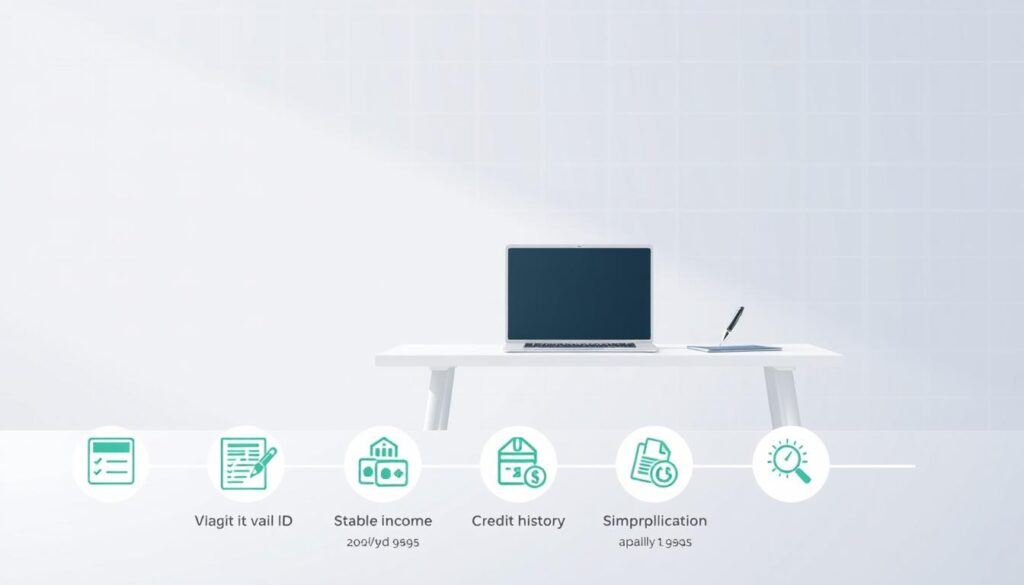Quick Loans: Flexible Financing Solutions for You
Did you know that nearly 40% of Americans can’t cover a $400 emergency expense?
Financial emergencies can pop up out of nowhere. That’s why we offer flexible financing solutions through quick loans. These loans help you deal with your immediate financial needs.
Our financing options are made to be flexible. They provide the financial help you need when times are tough. Our application process is easy, so you can get the funds you need quickly.
Key Takeaways
- Quick loans offer a viable solution for unexpected expenses.
- Flexible financing options cater to diverse financial needs.
- A straightforward application process ensures timely access to funds.
- Our financing solutions are designed to be adaptable to your financial situation.
- We provide a lifeline during financial emergencies.
What Are Quick Loans?
Quick loans are a fast way to get money when you need it. They help people who face sudden expenses or money problems.
Definition and Overview
Quick loans, also known as fast cash advances or instant approval loans, give you quick access to cash. They are known for their easy application and fast money delivery.
These loans have simple requirements and flexible payback plans. They are great for those who need money fast.
How They Work
Quick loans give you a sum of money to pay back later, with interest. You just need to fill out some basic info to apply.
Once approved, the money goes into your account quickly. Then, you pay back the loan, interest, and fees as agreed.
| Loan Feature | Description | Benefit |
|---|---|---|
| Application Process | Simple and straightforward | Easy to apply |
| Documentation Requirements | Minimal documentation needed | Less paperwork |
| Disbursement Time | Rapid disbursement of funds | Quick access to cash |
| Repayment Options | Flexible repayment schedules | Manageable repayments |
Benefits of Quick Loans
Quick loans offer several key benefits for managing financial emergencies. They provide immediate financial relief. This makes them a good choice for those facing unexpected expenses or financial shortfalls.
Fast Access to Funds
One major advantage of quick loans is the fast access to funds they offer. Unlike traditional loans, quick loans are processed quickly, often in a few hours or days. This quick access to money is crucial for urgent needs like medical emergencies or car repairs.
Minimal Documentation Requirements
Quick loans also have minimal documentation requirements. Borrowers only need to provide basic personal and financial information. This makes the application process easy and hassle-free. It reduces the administrative burden on borrowers, allowing them to get the funds they need quickly.
Flexible Repayment Options
Another big benefit of quick loans is the flexible repayment options they offer. Lenders provide repayment plans that fit the borrower’s financial situation. This helps prevent debt traps and makes it easier to manage loan repayments. This flexibility is great for those with variable income or facing temporary financial setbacks.
| Benefit | Description | Advantage |
|---|---|---|
| Fast Access to Funds | Rapid processing and disbursement of loan amounts | Addresses urgent financial needs promptly |
| Minimal Documentation | Simplified application process with fewer requirements | Reduces administrative burden on borrowers |
| Flexible Repayment Options | Varied repayment plans to suit different financial situations | Helps prevent debt traps and facilitates manageable repayments |
Types of Quick Loans Available
Quick loans come in many forms, each for different needs. Whether it’s an unexpected bill or a chance to make money, there’s a loan for you.
Personal Loans
Personal loans are great for many things. You can use them to pay off debt or buy something big. Banks, credit unions, and online lenders offer them.
Personal loans are flexible. You can pick how long you want to pay them back. Some even let you pay off the loan early without extra fees.
Payday Loans
Payday loans help you get by until your next paycheck. They’re fast to get and often give you money the same or next day.
But, payday loans have high interest rates and fees. Make sure you understand the terms before you agree to one.
Installment Loans
Installment loans give you money upfront to pay back in installments. You can use them for home improvements or unexpected bills.
Installment loans have better repayment terms than payday loans. They have fixed interest rates and set payments, helping you budget better.
In summary, there are many quick loans out there. By knowing what each loan offers, you can choose the best one for your situation.
Who Can Apply for Quick Loans?
To get a quick loan, you need to know the basic rules set by lenders. These rules help make sure you can pay back the loan.
Eligibility Criteria
Quick loans have certain rules you must follow. These rules help lenders know you can handle the loan payments.
Key Eligibility Factors:
- Age: You must be at least 18 years old (or the legal age in your state).
- Income: You need a steady job to show you can pay back the loan.
- Identification: You must have valid ID to prove who you are.
Age and Income Requirements
Age and income are key for quick loans. Lenders usually want you to be between 18 and 65 years old. But, this can change.
The income rule makes sure you have enough money to repay the loan. Here’s what you usually need:
| Requirement | Typical Criteria | Variation |
|---|---|---|
| Minimum Age | 18 years | May vary by state or lender |
| Maximum Age | 65 years | Can vary depending on the lender’s policies |
| Income Requirement | Stable income source | May include employment, benefits, or other regular income |

It’s important to check these rules before applying. Knowing the implications of borrowing helps. Meeting the criteria makes the application process easier.
Application Process for Quick Loans
Getting a quick loan is easy and fast. You can do it all online in just a few minutes. It’s made simple so you can quickly apply and get a yes or no.
How to Start Your Application
To begin, go to the website of a lender that offers quick loans. Most have an online form you can fill out quickly. You’ll need to share some basic info like your name, where you live, how much you make, and where you work.
Key information required for the application includes:
- Identification details
- Bank account information
- Employment and income verification
As Forbes points out, “Online lending has made applying for loans easier than ever. You can do it from home.”
“The application process is typically straightforward, with most lenders providing a simple online form to fill out.”
What to Expect During Approval
After you apply, the lender will check your info. This includes a credit check and verifying your job and income. They’ll decide based on your credit and other things.
Quick loans get approved faster than regular loans. Some lenders decide in minutes or hours. If you get approved, the money goes into your bank account the next business day.
To ensure a smooth application process:
- Have all needed documents ready
- Fill out the form correctly
- Read the terms and conditions before you submit
Finding the Right Lender for Quick Loans
There are many lenders for quick loans, so finding the right one is key. It’s important to research and compare them. The lender you choose can greatly affect your loan experience.
Researching Lenders
Looking into potential lenders is a big step. We need to think about their reputation, customer service, and loan terms. A good lender will be clear about their loan details, helping us make a better choice.
To begin, we can search for lenders online, read reviews, and ask people we know. It’s also smart to check if they’re licensed in our state and if they belong to professional groups.

Comparing Interest Rates and Fees
When picking a lender, comparing interest rates and fees is crucial. Interest rates can greatly change the loan’s total cost. So, it’s important to look at rates from different lenders to find the best one.
As
“The key to saving money on a loan is to compare, compare, compare.”
, it’s also vital to understand all the fees. This includes origination fees, late fees, and penalties for early repayment. We should carefully read the loan agreement to know all the costs.
By comparing rates and fees, we can find the lender with the best deal. This way, we can save money and avoid problems with high rates and hidden fees.
Understanding Interest Rates on Quick Loans
Quick loans have interest rates that change based on different factors. It’s key to know how these rates work and what affects them.
Factors Influencing Interest Rates
The interest rate on a quick loan isn’t random. It’s shaped by several important factors. Credit score is a big one, as lenders see it as a risk indicator. A better credit score means a lower rate, while a worse score means a higher rate.
The loan amount also matters. Bigger loans often have different rates than smaller ones. The repayment term is another factor, with longer terms possibly having different rates than shorter ones.
| Factor | Influence on Interest Rate | Example |
|---|---|---|
| Credit Score | A higher credit score can lower the interest rate. | A credit score of 750 might get a 10% interest rate. |
| Loan Amount | Larger loans might have lower interest rates. | A $10,000 loan might have a lower rate than a $1,000 loan. |
| Repayment Term | Longer terms might have higher interest rates. | A 5-year term might have a higher rate than a 1-year term. |
Fixed vs. Variable Rates
Quick loans can have either fixed or variable interest rates. A fixed rate stays the same, making payments predictable. A variable rate can change with the market, affecting payments over time.
Financial expert
“Understanding whether your loan has a fixed or variable interest rate is crucial for managing your finances effectively.”
It’s important to pick the right interest rate for our financial situation. If we want stability, a fixed rate might be better. But if we think rates will fall, a variable rate could be more beneficial.
Potential Risks of Quick Loans
Quick loans are handy, but they also have risks. It’s important to know these risks to make smart borrowing choices.
High-Interest Rates
High-interest rates are a big risk with quick loans. These rates are often much higher than regular loans. This means you’ll have to pay back more money.
Some lenders charge interest rates over 30% APR. This can make the loan very expensive.
Debt Cycle Risks
Another risk is getting stuck in a debt cycle. If you can’t pay back the loan on time, you might take out another one. This creates a cycle of borrowing that’s hard to break.
This cycle can lead to long-term financial problems.
To show the risks, here’s a table comparing different loans:
| Loan Type | Interest Rate (APR) | Total Repayment Amount |
|---|---|---|
| Quick Loan | 36% | $1,360 |
| Personal Loan | 12% | $1,120 |
| Traditional Bank Loan | 6% | $1,060 |
Before getting a quick loan, think carefully about the risks. Look at your finances, understand the loan terms, and plan how you’ll pay it back. This can help you avoid big problems.
Tips for Managing Quick Loans Wisely
Managing quick loans well is crucial to stay financially stable. It helps avoid the risks that come with these loans. By doing it right, you can keep your finances in check.
To manage quick loans effectively, knowing your financial situation and the loan terms is key. Creating a repayment plan is a must. This ensures you pay on time and meet your financial obligations.
Creating a Repayment Plan
Creating a repayment plan involves several steps. First, understand the total amount you need to repay, including principal and interest. Then, look at your income and expenses to see how much you can pay each month.
- List all your income sources.
- Track your monthly expenses to find ways to cut back.
- Set a realistic repayment schedule based on your financial situation.
By following these steps, you can make a repayment plan that fits your budget. It’s also smart to set reminders for your payment due dates to avoid late fees.
Avoiding Additional Debt
Avoiding more debt is key when managing quick loans. Taking on more debt while paying off a quick loan can trap you in a debt cycle.
“The key to financial stability is not just about repaying your debts, but also about avoiding new debts. Borrowers should focus on living within their means and saving for emergencies to avoid the need for additional loans.”
To avoid additional debt, consider these strategies:
- Reduce unnecessary expenses.
- Build an emergency fund to cover unexpected expenses.
- Avoid applying for multiple loans or credit cards.
By using these strategies, you can keep your finances healthy. This ensures your quick loan helps without causing more financial problems.
Alternatives to Quick Loans
Looking for financial help? There are better options than quick loans. These alternatives offer better terms and lower risks. They might not solve your immediate problem, but they can help in the long run.
Credit Cards
Credit cards are a good choice. They give you a credit line to use when you need it. Many cards also offer rewards or cashback. But, remember the interest rates and fees can add up fast if not managed well.
Personal Lines of Credit
A personal line of credit lets you borrow as needed up to a limit. It’s great for covering ongoing or unexpected expenses. These lines often have lower interest rates than quick loans, making them a better choice for some.
Want to learn more about managing your money? Check out https://mycreditunion.gov/manage-your-money/consumer-loans-credit-cards/payday-alternative-loans. They talk about payday alternative loans, which could be a better financial option.
Borrowing from Friends or Family
Borrowing from friends or family is another option. It avoids the high-interest rates of quick loans. But, it’s important to be clear and careful to keep your relationships strong.
In summary, quick loans might solve immediate money problems. But, think about credit cards, personal lines of credit, and borrowing from loved ones. Each has its own benefits and drawbacks. It’s key to consider them all carefully.
Conclusion: Is a Quick Loan Right for You?
As we wrap up our look at quick loans, it’s key to sum up the main points and offer some last-minute advice. Quick loans can be a great financial help if used wisely.
Key Considerations
Before choosing a quick loan, take a close look at your finances, the loan’s details, and other choices. Think about things like interest rates, how long you’ll pay it back, and any fees.
Decision-Making Strategies
To make a smart choice, make a plan for paying it back, steer clear of more debt, and check out other financing options. This way, you can make sure a quick loan fits your financial plans and doesn’t cause extra stress.
In the end, making a smart choice about quick loans means thinking carefully about your money situation and the loan’s terms. By following these tips, you can feel confident in your decision.









